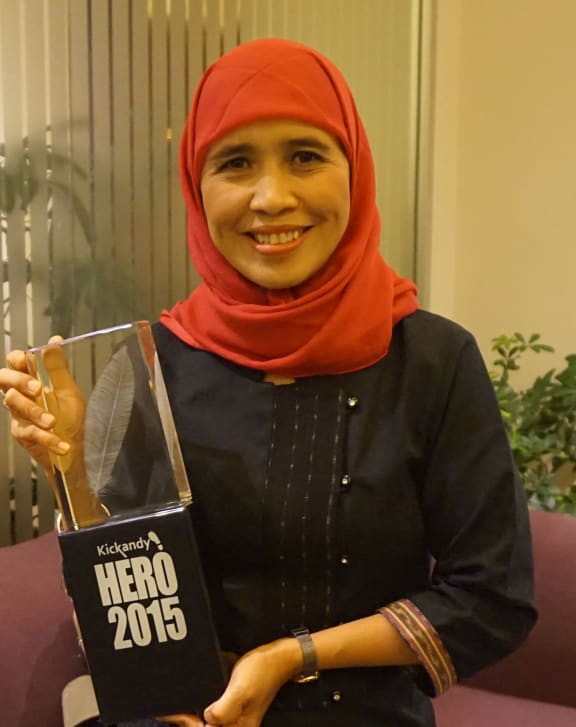
Nani Photo: Supplied
Nani Zulminarni is on a mission to empower women in her home country of Indonesia, especially those marginalised by the status of being single, widowed, abandoned or divorced.
Despite there being about 6 and a half million women heads of households in Indonesia, they have no social or legal recognition. After her divorce in 2000 Nani found that she often faced discrimination and stereotyping as a divorcee, which led her to projects to empower poor women heads of households.
She then founded PEKKA, an organization that supports over 30,000 rural widows, abandoned and divorced women in more than 800 villages throughout Indonesia, assisting its members and leaders with access to livelihood resources, decision-making processes, social protection and justice.
Read an edited excerpt of the interview below:
30,000 rural widows or abandoned or divorced women, 800 villages throughout Indonesia – this is a big organisation. How quickly has it built?
Fifteen years. It’s very slow actually. We wish we could reach more but it’s very difficult because the members of this group are really the poorest of the poor and to really bring them into this organisation is not easy. We have to go house by house.
What kind of resistance do you come across?
The first is from the community themselves. We start organising and they come, ‘What are you doing?’ and they spread rumours that we will traffic them, that we will sell them into prostitution, because the women don’t have husbands. For the first three years we were rejected by many villagers and also by traditional leaders. They’re male usually, do not like what we are doing. Local government as well… but after, maybe starting the fifth year, we slowly started to get some recognition.
Are they starting to see some of those entrenched interests, starting to see that you’re solving some problems?
Yes, also they see the leadership of the women grow and even we in the Eastern part of Indonesia we have seen a few women become village head, elected by the whole village. It’s a huge transformation because they were being discriminated against but they’re now becoming the village head.
While it’s solving problems and upsetting the status quo, I can see that it’s getting wider support, but is it going to get to a wider point where there is more of a democratic element to it and some of the entrenched interests might say, ‘Hang on a minute’. Do you think about that or do you see it as an important building block towards more broader rights and leadership roles?
We do, yes. We think it is a building block and also we try to really use the PAKKA association to really modify other marginalised groups to do the same, to take the broader leadership in the community because they understand how being the poorest of the poor and how to facilitate the other community members.
That 15 years coincides with your own personal circumstances almost exactly. What was your own experience being a married woman and socially acceptable and then what was your experience after your divorce, how dramatic was it?
Well it is very bad. I never imagined, because before when people would say, ‘It’s very difficult’, being a divorced woman, single woman, I never imagine about that. So when I experience this, it’s real.
So I had experience when I started organising this and I had meetings in this conflict area and behind us were several mens village head. When I introduced myself and said that my name is Nani and I am divorced and I have three sons, suddenly this man stands up and points his finger to my face and said, ‘Did you say that you’re divorced? How dare you come to my village and want to work with my women while you can’t even take care of your husband.’ So that made me aware of how bad people see divorced women while they don't even understand why we get divorced. Nobody wants to get divorced, especially when you have children. I reject to be in a polygamous marriage and I do not want to be betraying my marriage, so that is why I get divorced.
It is really difficult and at the same time I was with a women’s organisation at the time and I felt embarrassed. How can a leader of the women’s’ organisation get divorced? So that is why then I resigned from this organisation and I started my own organisation called PAKKA, because I thought I had to heal myself. I got divorced and I have three small children and I lost my income. It was very difficult even for me; I have a good education background, I have my friends, I have all of my connections and network. It’s difficult.
I travelled around several places in Indonesia and I found these poor women living alone with five small children in the middle of nowhere, with nothing, and yet she can smile and she can survive. It makes me feel like something must be organised with these women to get all of their energy and spirit to fight this.

